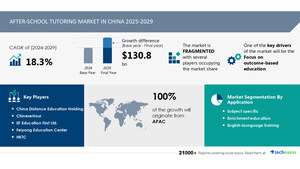NEW YORK, Sept. 24, 2024 /PRNewswire/ -- Report with market evolution powered by AI- The global kombucha market size is estimated to grow by USD 8.36 billion from 2024-2028, according to Technavio. The market is estimated to grow at a CAGR of over 27.48% during the forecast period. Health benefits of kombucha is driving market growth, with a trend towards packaging innovations and increasing marketing initiatives. However, availability of counterfeit kombucha drinks poses a challenge. Key market players include Asheville Kombucha Mamas LLC, Brew Dr. Kombucha, GTs Living Foods, Health Ade LLC, Holy Kombucha Inc., Humm Kombucha LLC, K95 Foods Pvt Ltd., Kosmic Kombucha, LIVE Soda LLC, Margaret River Kombucha Co. Pty Ltd., NessAlla Kombucha, PepsiCo Inc., Rauch Fruchtsafte GmbH and Co OG, Remedy Drinks Pty Ltd, Rowdy Mermaid Kombucha, Slades Beverages, SOMA Kombucha, Suja Life LLC, The Coca Cola Co., and The Hain Celestial Group Inc..
AI-Powered Market Evolution Insights. Our comprehensive market report ready with the latest trends, growth opportunities, and strategic analysis- View your snapshot now
Forecast period |
2024-2028 |
Base Year |
2023 |
Historic Data |
2018 - 2022 |
Segment Covered |
Type (Organic and Non-organic), Distribution Channel (Offline and Online), and Geography (North America, Europe, APAC, Middle East and Africa, and South America) |
Region Covered |
North America, Europe, APAC, Middle East and Africa, and South America |
Key companies profiled |
Asheville Kombucha Mamas LLC, Brew Dr. Kombucha, GTs Living Foods, Health Ade LLC, Holy Kombucha Inc., Humm Kombucha LLC, K95 Foods Pvt Ltd., Kosmic Kombucha, LIVE Soda LLC, Margaret River Kombucha Co. Pty Ltd., NessAlla Kombucha, PepsiCo Inc., Rauch Fruchtsafte GmbH and Co OG, Remedy Drinks Pty Ltd, Rowdy Mermaid Kombucha, Slades Beverages, SOMA Kombucha, Suja Life LLC, The Coca Cola Co., and The Hain Celestial Group Inc. |
Key Market Trends Fueling Growth
The kombucha market has experienced significant growth due to packaging innovations and increased marketing initiatives. In the packaging sector, companies like Health-ade and Healthy Brands Collective differentiate their products through unique bottle designs and protective packaging. Health-ade's squared corner bottles and new tagline, and Healthy Brands Collective's amber glass bottles, are examples of such innovations. Simultaneously, marketing efforts, such as Reed's and Health-ade's integrated campaigns on newspapers, magazines, and social media, have increased product awareness. KeVita's Instagram campaign, where fans upload selfies with brand filters, is another effective marketing strategy. These efforts broaden brand appeal among retailers and consumers, contributing to the growth of the global kombucha market.
The Kombucha market is experiencing significant growth, driven by increasing consumer interest in craft beverages and functional health benefits. This probiotic drink, made through the fermentation process, is available in various formats, including glass bottles, aluminum cans, and PET bottles. Online retailers and health stores are key sales channels, but convenience stores are also jumping on the bandwagon. Diverse palates are fueling the trend with flavors like hibiscus lime, lavender, blueberry, guava, Kombrewcha, mango pineapple, and blood orange. Major players like Ekaterra are expanding their RTD supplier revenue by catering to this market. Nutritional values, alcohol content, and secondary fermentation are important considerations. Regulatory organizations are closely monitoring the market, covering various analyses under PESTLE analysis. Packaging evolution is a crucial aspect, with cans and bottles becoming more accessible and convenient for consumers. Brands are focusing on health advantages, gut flora, and functional beverages for global expansion. DIY kombucha culture and local, artisanal offerings continue to thrive. Cookware, cookbooks, baking supplies, and ready-to-drink beverages are common kitchen cabinet essentials for home brewers.
Insights on how AI is driving innovation, efficiency, and market growth- Request Sample!
Market Challenges
- The global kombucha market faces a significant challenge with the prevalence of counterfeit products. These imitations negatively impact market growth and create an uneven competitive landscape for legitimate kombucha vendors. Counterfeit kombucha products, sold primarily through e-commerce platforms, lack quality and are priced lower than genuine items. Consumers in regions like APAC and the Middle East are often misled by similar product names and packaging, damaging the sales and brand reputation of genuine kombucha vendors. The presence of counterfeit kombucha products is expected to hinder the growth of the market during the forecast period.
- The Kombucha market is thriving in the health and wellness sector, with functional beverages becoming increasingly popular. Global expansion is a key challenge as this niche industry seeks to reach wider audiences. Accessibility remains a concern, with some consumers preferring DIY kits, while others look for convenient ready-to-drink options. Mainstream appeal is growing, with celebrity endorsements and health influencers promoting its authentic flavors and nutritional benefits. Functional beverages offer gut health advantages, including digestion support and blood pressure management. Kombucha's fermentation process involves bacteria, yeast, sugar, and a Symbiotic Culture of Bacteria and Yeast (SCOBY). Product innovation includes spray-drying and powder form for greater accessibility. CVC Capital Partners and Harris Tea Company have invested in the market, while local and artisanal brands continue to thrive. Packaging evolution is crucial, with various types catering to different consumer preferences. Cookware, cookbooks, and baking supplies are common kitchen items used in homemade kombucha production. Fruits, herbs, and spices, as well as flowers, add flavor and health benefits. The craft beverage movement fuels market growth, with lactic acid bacteria and probiotics contributing to immunity and heart health.
Insights into how AI is reshaping industries and driving growth- Download a Sample Report
Segment Overview
This kombucha market report extensively covers market segmentation by
- Type
- 1.1 Organic
- 1.2 Non-organic
- Distribution Channel
- 2.1 Offline
- 2.2 Online
- Geography
- 3.1 North America
- 3.2 Europe
- 3.3 APAC
- 3.4 Middle East and Africa
- 3.5 South America
1.1 Organic- The Kombucha market has experienced significant growth in recent years. Consumers are increasingly drawn to this fermented tea beverage for its unique taste and perceived health benefits. Producers are meeting this demand by expanding production and distribution channels. Key players in the industry include GT's Kombucha, KeVita, and Synergy Drinks. These companies offer various flavors and sizes to cater to diverse consumer preferences. The market is expected to continue growing due to increasing health consciousness and consumer interest in natural and organic products.
Download complimentary Sample Report to gain insights into AI's impact on market dynamics, emerging trends, and future opportunities- including forecast (2024-2028) and historic data (2018 - 2022)
Kombucha, a fermented tea beverage, has gained significant popularity in the health and wellness scene as a functional beverage. Its unique taste, derived from the symbiotic culture of bacteria and yeast (SCOBY), produces lactic acid bacteria and probiotics, enhancing digestion and supporting gut health. With its mainstream appeal, the global kombucha market is expanding, making this probiotic drink more accessible to consumers. Functional beverages, including kombucha, offer health advantages beyond basic hydration. The evolution of kombucha packaging has made it more convenient for consumers to enjoy this beverage at home or on-the-go. Local and artisanal kombucha producers continue to thrive, while major players focus on innovation and product development. Kombucha comes in various flavors such as hibiscus lime, lavender, blueberry, and guava, catering to diverse consumer preferences. The brewing process involves fermenting tea, sugar, and water, with the addition of bacteria and yeast. The resulting drink provides a natural source of probiotics, aiding in maintaining a healthy gut flora.
Kombucha, a fermented tea beverage, has gained significant popularity in the health and wellness industry due to its functional properties. This once niche beverage has grown into a global phenomenon, appealing to a wide range of consumers. The accessibility of DIY kombucha culture and the emergence of local and artisanal producers have contributed to its mainstream appeal. Packaging evolution, from kitchen cabinet to residential buildings, cookware, cookbooks, and baking supplies, has made kombucha more convenient for consumers. Ready-to-drink beverages have also entered the market, catering to the demand for convenience. Celebrity endorsements and health influencers have further boosted the popularity of kombucha. Product innovation and technology have led to the development of spray-drying and powder form, making it easier to consume on-the-go. Major players in the tea industry, such as Ekaterra, have entered the market, driving revenue growth. The craft beverage movement has embraced kombucha, leading to an array of authentic flavors using fruits, herbs, and spices, as well as flowers. Regulatory organizations have analyzed various aspects of kombucha, including secondary fermentation, flavorings, and nutritional values. The fermentation process produces probiotics, aiding digestion and gut health, as well as offering benefits for blood pressure management, heart health, and immunity. The kombucha market includes various players, from small-scale producers to large corporations. Some key trends include the use of alcohol content in fermentation, probiotic drinks, and the role of gut flora in health advantages. Consumer interest in flavors like hibiscus lime, lavender, blueberry, guava, and Kombrewcha, as well as mango pineapple and blood orange, continues to drive growth. The market includes various packaging types, such as glass bottles, aluminum cans, and PET bottles, sold through online retailers, health stores, convenience stores, and diverse palates.
1 Executive Summary
2 Market Landscape
3 Market Sizing
4 Historic Market Size
5 Five Forces Analysis
6 Market Segmentation
- Type
- Organic
- Non-organic
- Distribution Channel
- Offline
- Online
- Geography
- North America
- Europe
- APAC
- Middle East And Africa
- South America
7 Customer Landscape
8 Geographic Landscape
9 Drivers, Challenges, and Trends
10 Company Landscape
11 Company Analysis
12 Appendix
Technavio is a leading global technology research and advisory company. Their research and analysis focuses on emerging market trends and provides actionable insights to help businesses identify market opportunities and develop effective strategies to optimize their market positions.
With over 500 specialized analysts, Technavio's report library consists of more than 17,000 reports and counting, covering 800 technologies, spanning across 50 countries. Their client base consists of enterprises of all sizes, including more than 100 Fortune 500 companies. This growing client base relies on Technavio's comprehensive coverage, extensive research, and actionable market insights to identify opportunities in existing and potential markets and assess their competitive positions within changing market scenarios.
Technavio Research
Jesse Maida
Media & Marketing Executive
US: +1 844 364 1100
UK: +44 203 893 3200
Email: [email protected]
Website: www.technavio.com/
SOURCE Technavio

WANT YOUR COMPANY'S NEWS FEATURED ON PRNEWSWIRE.COM?
Newsrooms &
Influencers
Digital Media
Outlets
Journalists
Opted In




Share this article